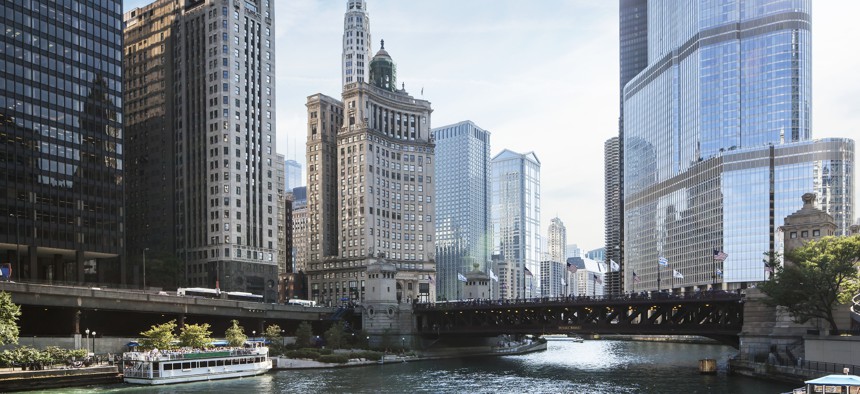One of the Nation's Biggest Cities Begins Cash Payments to Low-Income Residents

The Chicago River and skyline. Bjarte Rettedal via GETTY IMAGES
For the next year, Chicago plans to distribute $500 a month to thousands of households who can use the money as they see fit.
Thousands of Chicago households are receiving their first monthly payment of $500 as the city rolls out its guaranteed income pilot program—one of the largest in the nation.
The $31.5 million Chicago Resilient Communities Pilot will distribute $500 to 5,000 households for the next twelve months. The program is designed to target low-income residents who suffered disproportionate economic hardship during the Covid-19 pandemic.
City officials have emphasized that there are “no strings attached” to how the money can be spent by recipients.
“People know what they need to move forward in their lives,” Chicago’s Department of Family and Support Services Commissioner Brandie Knazze said in a statement on Monday. “Whether that is paying for childcare, groceries, baby formula or utility bills — we want participants to have the choice and flexibility necessary to thrive on their terms.”
The program is part of the $1.2 billion Chicago Recovery Plan, which aims to support an equity-oriented economic recovery from the pandemic.
Guaranteed income initiatives have gained traction coast-to-coast over the past three years since Stockton, California launched a closely watched program in 2019.
According to Mayors for a Guaranteed Income, a coalition of more than 80 mayors advocating for an income floor, $200 million in unconditional financial assistance will be available to people across the country because of programs that have already been established or are in the process of getting up and running.
Last year, California became the first in the country to approve a state-funded guaranteed income program. Since then, some cities—including Minneapolis, Seattle, and now Chicago—have used federal aid from the American Rescue Plan Act to fund their own programs.
In Chicago, 176,000 people from across the city applied for the pilot program during a three-week application period this spring, according to Mayor Lori Lightfoot’s office.
Recipients were selected through a lottery system and were required to meet several eligibility criteria, including having a household income at or below 250% of the federal poverty line and having experienced financial hardship as a result of the Covid-19 pandemic. The selection process “prioritized households living in poverty and those in communities with preexisting economic hardship,” the mayor’s office said.
Preliminary city data show that of the residents who were selected for the pilot, 61% have incomes below the federal poverty level, which is $27,750 for a family of four this year.
Most program participants, 67%, identified as Black or African American, 23% as Latino or Hispanic, 16% as white and 3% as Asian. Other data show that 70% of recipients are women, 61% parents or caregivers, and 17% have a disability.
The funds will be issued through direct deposit or debit cards, according to the mayor’s office.
GiveDirectly, a nonprofit that facilitates cash-transfer programs around the world, is administering the program and oversaw the application and selection process.
Molly Bolan is the assistant editor for Route Fifty.
NEXT STORY: Covid Aid Program Gave 'Shuttered Venues' Funds They Didn't Ask For






